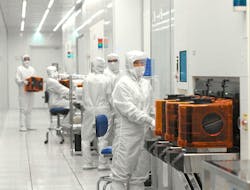Samsung, trying to gain ground on TSMC in the contract chip making market, said that it's ready to start sampling processors based on its 5-nanometer node. Initial production is set to start at some point in 2020. Samsung said chips based on its 5-nanometer process would offer 25% higher area efficiency at 20% lower power or 10% higher performance than its 7-nanometer node, which entered production last year.
The 5-nanometer process is targeted at the chips inside smartphones, data centers, cars and other applications, according to Charlie Bae, who heads up the company's foundry business unit. Samsung said one advantage of its 5-nanometer process is that customers can reuse their 7-nanometer chip designs. That way, customers moving from 7-nanometers to 5-nanometers can save themselves more time and money.
Samsung said that it would use EUV technology for some parts of the 5-nanometer process to cut down the cost of etching these infinitesimal circuits on silicon. Last year, Samsung announced that it would add another EUV production line to its Hwaseong, South Korea-based fab. Construction is set to wrap up in the second half of 2019 at an estimated cost of $6 billion. Production ramp-up is projected to start next year.
The company is chasing TSMC, which holds roughly half of the $60-billion contract chip making market. TSMC says that its 5-nanometer node will augment area efficiency by 80% versus its 7-nanometer node, the chip industry's most advanced. TSMC also promises to boost performance by 15%. Samsung, a distant second to TSMC with less than 20% market share, sees its 5-nanometer node increasing performance by around 10%.
Samsung is taking on TSMC at the same time the smartphone industry—including Apple, Qualcomm, Huawei and other market leaders that pounce on TSMC's latest production processes—is shifting to 5G technology. But TSMC is still slightly ahead. TSMC reported revenue of $1.56 billion in the first quarter from its 7-nanometer process, which was introduced last year ahead of Samsung's. The company's total sales came to $7.1 billion.
The battle to create smaller, faster and cheaper computer chips has turned into an increasingly complex and expensive endeavor. Last year, the No.3 contract chip manufacturer, Globalfoundries, shut down its 7-nanometer development due to soaring costs. Intel, under pressure not to fall further behind TSMC and Samsung, is trying to escape from a manufacturing crisis at the 10-nanometer node, which has suffered major delays.
Samsung is also struggling to shake the slowdown in Moore's Law, the semiconductor industry's playbook for producing smaller, faster and cheaper computer chips. Samsung says that its 7-nanometer process serves up chips featuring 40% better area efficiency with 10% higher performance or 35% less power consumption than 10-nanometers, bigger benefits than customers will get out of the company's 5-nanometer node.
About the Author
James Morra
Senior Editor
James Morra is the senior editor for Electronic Design, covering the semiconductor industry and new technology trends, with a focus on power electronics and power management. He also reports on the business behind electrical engineering, including the electronics supply chain. He joined Electronic Design in 2015 and is based in Chicago, Illinois.

